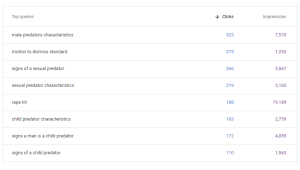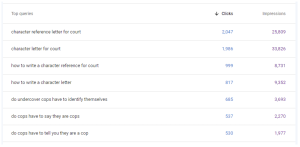The Answer: Yes, Only if It’s Quality Content
The very overused phrase of “content is king” needs to be updated to “valuable and helpful content is king and everything else is filler.” With a thoughtfully and strategically crafted content strategy, you can “passively” generate leads by targeting intent-driven keywords. Users often use long-tail keywords and have a goal in mind: “I need to better understand this topic before I take action.”
If valuable content is king, then cornerstone content would be the equivalent of a Greek god – it’s one of a select group of specialized content pages that stands out far above the rest. It’ll very often have a high engagement rate with users sticking around for 2-3 minutes (or more!) along with taking a conversion-related action. In the case of most law firms, the conversion is often a phone call, contact form submission, or engaging with chat.
Wordstream defines cornerstone content as:
“A high-value, foundational piece of content that is intended to help you start building traffic and brand awareness by showing people what you offer. Your cornerstone content should be highly relevant to your business goals – it helps you establish authority in your industry and will bring in a steady stream of site visitors who are likely interested in.. the services you offer.”
In short, investing the time and money in cornerstone content has these benefits:
Establishes authority and trust in your business
Increases your brand awareness
Brings in relevant site visitors
Builds natural links
Builds the top of your sales funnel
How to Determine What to Write
Crafting a piece of content worthy of wearing the cornerstone hat takes time and research. It’s not simply drafting a lengthy essay with a bunch of keywords shoved in there. This is where the help of a SEO manager comes in handy or setting aside a few hours on a Friday to think about key differentiators between you and your competition.
Here are some ways to approach your writing strategy:
What is your area of specialized expertise? For example, if you’re a personal injury attorney who primarily takes on multi-vehicle auto accidents, what information can you provide that’s helpful to someone searching the web if they’re stuck in insurance company limbo?
What relevant information can you provide to a potential lead in an easily digestible way? For example, you can break down a complex subject such as being arrested for felony weapons possession into a guide “5 Things To Do After You’ve Been Arrested for Weapons Possession.”
If you have the help of a SEO specialist, you can add a layer of data-backed strategy by exploring Google Search Console for keyword themes, mainly what your site is appearing for and not getting as many clicks. Here are some examples:
A criminal defense attorney appearing in SERP for drug offense terms in a different county. Is a “Guide to Drug Offense Charges in X-County” something worthwhile?
A personal injury attorney appearing for different child injury related keywords, users floating around to a couple pages, but no conversions. What are some themes on those couple pages you could expand on? Or could you consolidate those pages into one stronger page with expanded content?
Practical Application
Here are a couple of examples of cornerstone content in a real-life setting. One firm is specialized and has an established online presence that was built over time. The second firm handles cases in a broader practice area and has invested a significant amount of time in content and SEO over the course of 2021.
Personal Injury, Child Sexual Assault Cases
This firm is based in Louisiana with an emphasis in clergy sexual assault cases. They have a broader practice area of handling sexual assault cases specifically for minors by an adult. Much of their research-based information for long-tail queries is in their blog. They have been great about utilizing keyword data from Google Search Console as a guiding point for creating new content pieces.
Over the six months, they continually get clicks for these terms related to child predators.

For those keywords, we’re seeing these pages get clicks. There’s clearly a winner here in what page is getting the most attention and user interaction:

That blog post has relevant information that aligns with the user’s intent. That post is about four years old, received one minor content update last year, and has been a steady source of leads.
For this particular law firm, that post generates at least a few high-quality, high intent leads per month with one having turned into a major case. That alone has paid for the research time, getting the content written and optimized, and added to the site.
That post has been a versatile asset that could be used in various means from creating brand awareness, establishing thought leadership, and improving local authority.
Criminal Law, Defense
This firm is based in Kentucky with a primary focus in criminal defense cases. Throughout 2021, they worked closely with Mockingbird to develop a targeted content strategy aligned with specific themes, questions, and concerns of their potential clients. They have been great about connecting with their clients at a more human level and addressing each concern thoughtfully and tactfully. This provides a real-world context of what potential clients are experiencing.
There is a clear keyword theme over the past six months:

Further down the queries list are various terms related to gun laws and the age of consent in Kentucky.
These pages are the popular places according to Google Search Console:

Those pages get a lot of screen time with the average user spending over a minute, clicking to another page, then taking a conversion action such as calling the office or submitting a contact form. For the time invested into creating those pages, they’ve generated dozens of new clients.
Invest in Meaningful, Quality Content
I wish I could kick the phrase “content is king” to the curb. Adding content for the sake of adding content bloats your site and diminishes its effectiveness.
This is where working with a SEO manager becomes helpful – they will help you understand the data, pair with your practical experience as an attorney, and create helpful, quality pieces that will not only help improve the organic performance of your site, but also establish you as an authority in your market.
The strongest cornerstone content pieces are built with ongoing collaboration between the attorney and SEO advisor. It’s definitely worth taking a few hours every month to brainstorm, create, craft, and launch a new content piece that aligns with your greater business goals.